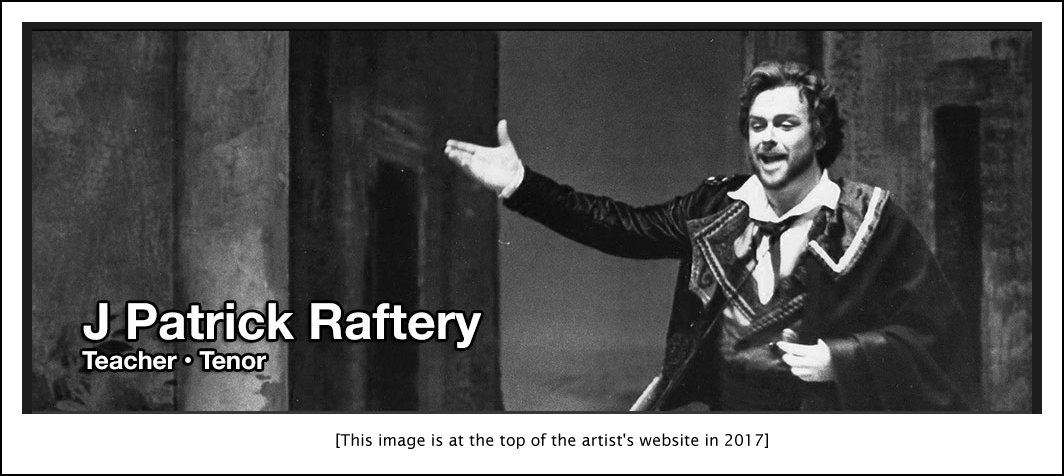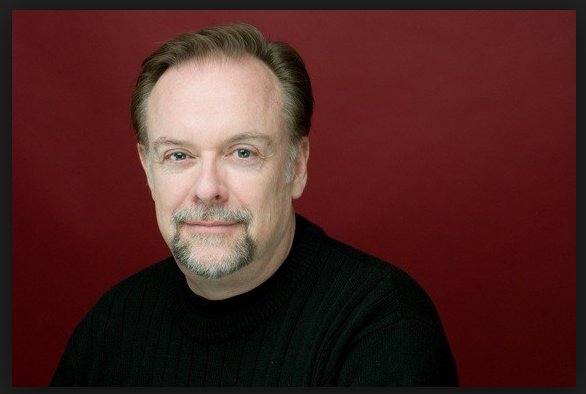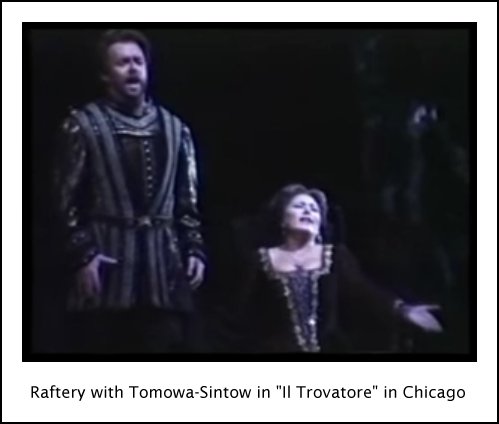

J. Patrick Raftery at Lyric Opera of Chicago
1980 - Boris Godounov [Opening Night] (Tchelkalov) - with Ghiaurov, Ochman, Sotin, Trussel, Baldani, Tyl, Gordon; Bartoletti, Everding, Lee, Schuler (Lighting for all these productions), Tallchief (Ballet) 1981 - Romeo and Juliette (Mercutio) - with Freni, Kraus, Bruscantini, Sharon Graham, Kunde, Cook, Negrini; Fournet, Melano, Gérard 1983 - La Bohème (Marcello) - with Cotrubas, Ciannella, Hong, Washington, Tajo; Navarro, Copley, Pizzi 1984 - Barber of Seville (Figaro) - with Kuhlmann/Mentzer, Araiza, Siepi, Bruscantini, Andreolli; Bartoletti, Sciutti, Hall 1986-87 - Lucia di Lammermoor (Enrico) - with Anderson/Gruberova, Domingo/Shicoff, Howell/Giaotti; Mackerras, Reichenback, Bardon, Hall (Costumes) 1987-88 - Il Trovatore [Opening Night] (Count di Luna) - with Tomowa-Sintow, Ciannella, Verrett, d'Artegna; Bartoletti, Frisell, Benois Faust (Valentin) - with Shicoff, Gustafson/Soviero, Ramey, Vozza; Fournet, Diaz, Samaritani, Tallchief |
 JPR:
I was a boy soprano and started studying opera very early. I was
in a production of Carmen at
seventeen. I was in high school, but the college doing the opera
didn’t have a baritone. It was fun singing
with all the ‘big kids’.
Then, through a friend I got a manager and spent a year doing nothing
but auditions. One of those was for Carol Fox of Lyric.
That was for a small role in Boris
Godounov, but in the meantime I did a Bohème with Luciano
Pavarotti, and on my way back from that engagement, I stopped and sang
for Lyric again, and that’s when I got the
contract for the Romeo.
JPR:
I was a boy soprano and started studying opera very early. I was
in a production of Carmen at
seventeen. I was in high school, but the college doing the opera
didn’t have a baritone. It was fun singing
with all the ‘big kids’.
Then, through a friend I got a manager and spent a year doing nothing
but auditions. One of those was for Carol Fox of Lyric.
That was for a small role in Boris
Godounov, but in the meantime I did a Bohème with Luciano
Pavarotti, and on my way back from that engagement, I stopped and sang
for Lyric again, and that’s when I got the
contract for the Romeo. JPR:
Me too. It’s bizarre, though. The
Countess has a child by Cherubino, and I think opera audiences would
have a hard time with that. Too bad Mozart didn’t
do it.
JPR:
Me too. It’s bizarre, though. The
Countess has a child by Cherubino, and I think opera audiences would
have a hard time with that. Too bad Mozart didn’t
do it. JPR:
Yes, and I really enjoyed Schaunard. In the last act, when he’s
the one to notice that Mimì has died, it’s
because he’s in love with her. It’s
a boy’s crush. He’s
the youngest of the Bohemians, and has probably been living in the
garret with them the least amount of time. He’s
probably about seventeen and has never seen anyone die before. He
idolizes Marcello and Colline and Rodolfo tremendously. Those
three are probably in their early twenties. But when Schaunard
sees Mimì for the first time in the second act, he loves her
immediately. It’s obvious that she’s
Rodolfo’s lover, so Schaunard can only
watch. In the last act he is concerned, but he is powerless to do
anything. So he sees that Mimì has died because he cannot
take his eyes off of her. The whole audience should feel with
him, and that’s one of the reasons it’s
so sad when Mimì dies. But now I’m
singing Marcello in several major places so I’m
probably saying good-bye to Schaunard.
JPR:
Yes, and I really enjoyed Schaunard. In the last act, when he’s
the one to notice that Mimì has died, it’s
because he’s in love with her. It’s
a boy’s crush. He’s
the youngest of the Bohemians, and has probably been living in the
garret with them the least amount of time. He’s
probably about seventeen and has never seen anyone die before. He
idolizes Marcello and Colline and Rodolfo tremendously. Those
three are probably in their early twenties. But when Schaunard
sees Mimì for the first time in the second act, he loves her
immediately. It’s obvious that she’s
Rodolfo’s lover, so Schaunard can only
watch. In the last act he is concerned, but he is powerless to do
anything. So he sees that Mimì has died because he cannot
take his eyes off of her. The whole audience should feel with
him, and that’s one of the reasons it’s
so sad when Mimì dies. But now I’m
singing Marcello in several major places so I’m
probably saying good-bye to Schaunard.This conversation was recorded in Chicago on December 18,
1981. This transcription was made and published in Nit&Wit Magazine in November of
1984. It was slightly re-edited, the photos and links were added,
and it was posted on this website in 2017.
To see a full list (with links) of interviews which have been transcribed and posted on this website, click here.
Award
- winning
broadcaster
Bruce Duffie was with WNIB, Classical 97 in Chicago from 1975
until
its final moment as a classical station in February of 2001. His
interviews have also appeared in various magazines and journals since
1980,
and he now continues his broadcast series on WNUR-FM, as well
as
on Contemporary Classical Internet Radio.